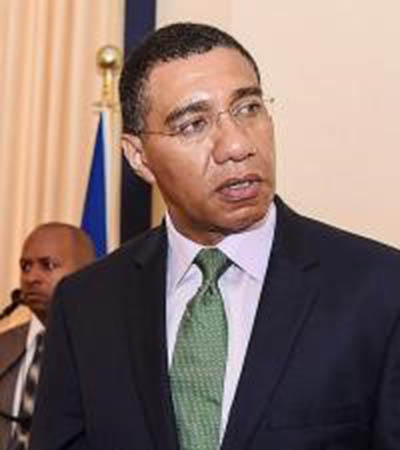(Jamaica Observer) LUCEA, Hanover — Prime Minister Andrew Holness yesterday warned parents of wayward children that, if necessary, the Government will introduce legislation to have them pay for their children’s bad behaviour.
“As the person who holds the portfolio now once again, along with minister Samuda who manages it day to day, we will be reviewing the methodologies and practices within the school system that are used to manage behaviour and, where necessary, we may very well have to introduce new legislation to hold parents to account,” warned Holness, which elicited applause.
The prime minister made the declaration in front of a large gathering of JLP supporters at an Area Council Four meeting held at Rusea’s High School in Hanover yesterday.
Area Council Four comprises the parishes of Han-over, St James, Trelawny, Westmoreland, and St Elizabeth.
Holness noted that when he was minister of education under the Bruce Golding-led Administra-tion, there was an issue with disruptive behaviour among students, which led to the establishment of the Parenting Support Com-mission to help parents develop necessary skills to help bring their children under control and ensure that their behaviour was properly adjusted for school. Holness said he had also implemented the deans of discipline programme through which specially trained teachers were posted to give support to guidance counsellors and school resource officers.
Holness argued that the initiatives, in tandem with the introduction of a safety and security policy for schools, went well as they resulted in improved student behaviours and the general safety and security in schools.
But, the prime minister pointed out yesterday that the resurgence in antisocial behaviours cannot escape notice.
“The problem that we are having is that if we are not controlling the children from they are children, from the home, it is quite unfair to expect the teacher who has to deliver her lesson as the instructional leader of the classroom to divert from her training to go and deal with disruptive kids in the classroom,” argued Holness.
The prime minister pointed to a recent incident in Portmore in which two students had been involved in a fight and the father of one of the children threatened to shoot up the school. Holness said the teachers have been left in fear.
Holness argued that, as a society, we should never tolerate such behaviour from any parent.
“We must never as a society allow any parent to do that to a school. And I am indicating from this platform that I will be having a special word with the [police] commissioner that that parent must be found and an example made of him. The full force of the law should be brought to bear on that parent,” charged Holness, again rousing applause.
Holness conceded that while it is in children’s nature to be generally mischievous, there are some whose behaviour go way beyond the realm of what is considered normal.
“There are some children whose behaviour disrupts the entire school; whose behaviour disrupts your child from learning and it is unfair that the entire school has to shut down because one child coming from one bad home without a parent talking to them and guiding them,” stated a displeased Holness,
“If you are here doing your part as a parent, then so too should every other parent do [his/her] part for their children,” he added.
In addressing recent calls for the resumption of caning (a form of corporal punishment) in schools, the prime minister said: “Children have the right to the inviolability of themselves. The physical self. And if it is that we want to build a society where we don’t have to use the threat of a gun to bring people under order, then from very young, we must learn to reason with our children.”
“So as we seek to build a kinder, gentler society, the State must not be resorting to violence to correct children. No. Neither should it promote it,’ the prime minister added.
He said the methods that the Government will rely on to address behavioural issues are more cerebral in that they engage the mind and seek to bring positive reinforcement rather than negative reinforcement.


